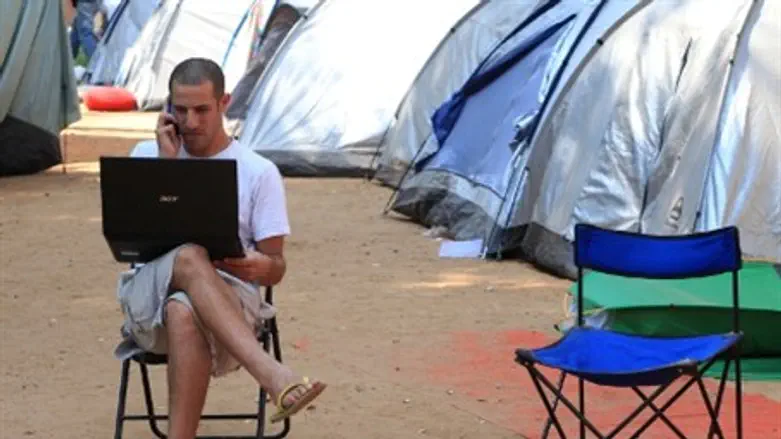
Foreign and local media have conjured up false images of an entire country in protest against a housing shortage in particular and Prime Minister Binyamin Netanyahu in general, and comparisons already have been drawn with the deadly Tahrir Square demonstrations in Egypt.
Local media, led by Globes and Yediot Acharonot, have reported every time a dozen people pitch tents or protest in small towns.
Foreign media, whose reporters often receive their slant from local colleagues, have painted a picture of Israel in revolt.
Reuters headlined its report, “Revolt or Summer Fever?” and the Los Angeles Times headlined, "ISRAEL: Is the Arab Spring Spreading to the Jewish State?”
The comparisons are far-fetched. The “tent city” in Jerusalem is more comparable to a Woodstock Festival, while Tahrir Square in Cairo, in a tyrannical dictatorship, was the bloody scene of tens of thousands of protesters clashing with armed soldiers who killed more than 800 demonstrators.
Coming on top of consumer protests against the high price of food and coinciding with a strike by doctors, the rallies have attracted Opposition leader Tzipi Livni, who has been in the shadows since her failure to beat out Netanyahu for the position of Prime Minister nearly three years ago. She marched with doctors on Wednesday as a measure of solidarity, getting resultant media time.
In contrast to nationalist protests against the expulsion of Jews from Gush Katif six years ago and continuing demolitions in Jewish communities in Judea and Samaria, the government, media and police have actively supported or have treated with “benign neglect" the protest actions which have similar components.
A national “stroller march” is planned for Thursday afternoon when parents are to push their toddlers in baby carriages and strollers to protest the high price of day care. When nationalists protested with their young children who were about to become homeless, the media covered the event by interviewing social workers and child welfare agencies about the dangers of exposing children to summer heat.
Similarly, media severely condemned nationalists for blocking streets, but little criticism has been heard over the same action by demonstrators against the housing shortage. Police, instead of sending mounted police to clear the roads, politely asked demonstrators on Thursday not to march on Highway 1, the major artery into Jerusalem.
The problems addressed by protesters are real. Israel’s cumbersome bureaucratic system, which serves the interests of a tiny group of millionaires, restricts land for building and encourages high prices. Prime Minister Netanyahu's platform included changing that, and this week he suggested revolutionary measures to change the system, but his ideas immediately were criticized by the media, the Greens and protesters.
The same situation exists in the consumer sector. A combination of limits on importers, price controls that often keep prices high instead of low, and bureaucratic-laden monopolies and oligarchies have plagued Israelis for decades. Netanyahu has tried to fight government control and privatize to encourage competition since his first term, but was severely criticized by the same groups who are protesting now.
The protest movement and mainstream media have lumped all of the age-old problems together and blamed Prime Minister Netanyahu for being the root cause. He even has been blamed for the failure to win the release of kidnapped soldier Gilad Shalit, who was kidnapped five years ago during the Olmert administration, which promised not to negotiate with terrorists for his return and in a matter of days reversed itself.
The protesters have taken advantage of the summer vacation to camp out in tents, but Reuters reported, “No one expects the kind of upheaval that has rocked the Arab world as citizens rise against authoritarian rulers and few see a serious challenge to Israel's conservative ruling coalition” headed by Netanyahu.
Lost in the demonstrations is the annual parade in Jerusalem of homosexuals, which was to postponed until Sunday in order not to detract from the anti-government rallies but which finally took place Thursday afternoon without incident.